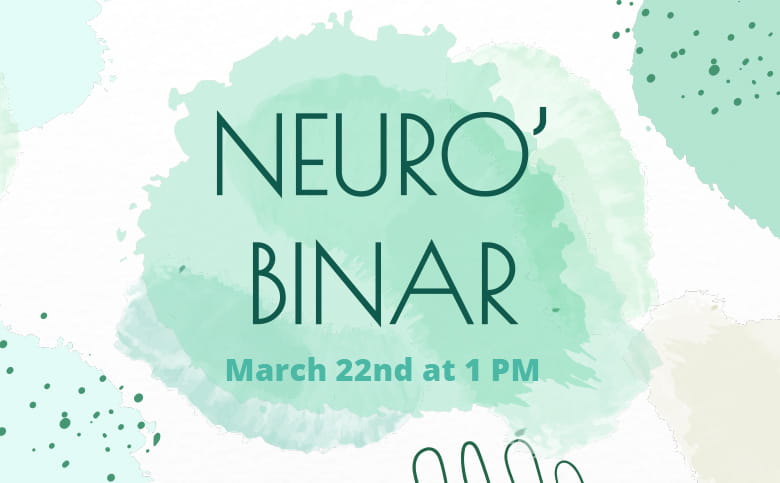
Neurobinar #13 : March 22nd at 1pm on Zoom
For this thirteenth neurobinar, join us online and learn about the work of Emmanuel Nivet (INP), Hannah Ihme (INT), and Martha Montse Rangel-Sosa (IBDM). Register on this page to receive the link to the webinar.
Take a break to get to know your colleagues!
On March 22 at 1pm, join us online and learn about the work of Emmanuel Nivet (INP), Hannah Ihme (INT), and Martha Montse Rangel-Sosa (IBDM). Hannah and Martha will each present the other’s doctoral project in a cross-presentation. After a Q&A session for the PhD students, François-Xavier will share with us his progress in his research work.
Format
The conference takes place online for one hour. It is composed of two parts: first, two PhD students give a 10-minute cross-presentation, each on the other’s thesis topic. After 5 min of questions, they pass the floor to a researcher, postdoc or engineer from the neuroscience community who presents an accessible version of his or her research in 20 min. Again, a question and answer session follows the presentation, and this is an opportunity to question the researcher, debate on the topic of the day and get to know your colleagues better
Register to receive the Zoom link
The speakers on March 22
Log in and discover the thesis project of Hannah Ihme (INT) presented by and Martha Montse Rangel-Sosa (IBDM) and vice versa. The presentation of the two PhD students will be followed by the presentation of the work of Emmanuel Nivet (INP). You will also have the opportunity to ask your questions and to review the Neurobinar on our YouTube channel.
Learn more about our guests with a summary of their background, bibliography and contact information.

Emmanuel Nivet is a CNRS researcher and a Principal Investigator at the Institute of NeuroPhysiopathology (INP), Aix-Marseille Université (AMU), France. He is the team leader of the “Stem Cells, Disease Modeling and Neuroregeneration” team since 2018. Emmanuel’s team strongly relies on the use of pluripotent stem cell-based disease modeling approaches, leveraging on human iPSCs and genome-editing, to study mechanisms underlying brain diseases pathogenesis, especially Alzheimer’s disease. Lately, his research primarily focuses on the role of glial cells in the pathology. Emmanuel received his M.Sc. degree and PhD degree in Neuroscience at Aix-Marseille Université, where his work was dedicated to the study of human adult olfactory stem cells as a potential tool for stem-cell based therapy in brain diseases. From 2009 to 2014, he worked as a postdoc at the Salk Institute for biological Studies with Pr. Juan Carlos Izpisua-Belmonte (La Jolla, CA, US). During his post-doctoral stay he mastered reprogramming approaches by being actively involved in various projects using cell-reprogramming strategies including iPSC-reprogramming, direct differentiation from pluripotent cells as well as direct reprogramming (transdifferentiation) and indirect reprogramming from somatic cells. In 2015, Emmanuel obtained a permanent researcher position from the CNRS to use his expertise in the reprogramming field in order to develop translational research projects aiming at unveiling and targeting novel cellular and/or molecular features in pathologic situations.
Hannah Ihme received her Bachelor's degree in Psychology from Philipps-University in Marburg, Germany in 2018, and her Master's degree from the same university in 2019. She completed her master's internship on the topic "Low-frequency deep brain stimulation in the inferior colliculus improves haloperidol-induced catalepsy and reduces anxiety in rats." Since 2019, she pursues her studies with a PhD at the INT of Marseille, in the CANOP team, under the supervision of Raoul BELZEAUX and Christine DERUELLE, and her subject is entitled "Interaction between attachment styles and resilience to trauma exposure: cognitive determinant and biological markers"...
I have done my previous studies in Mexico, I have a bachelor's degree in Biotechnology and a Master's degree in Molecular Biology and Genetic Engineering. Currently, I am in the 3rd year on my PhD, under the supervision of Sophie Chauvet at Fanny Mann's team, at the IBDM in Luminy. My team have describe that nerves actively sprout during pancreatic tumor development, having an impact during the progression of the disease, thus, my project focuses on trying to understand the underlying mechanisms and cells that could be triggering this axonal remodeling.










